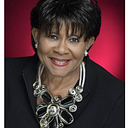Your Proactive Caregiver Advocate: Dr. Cynthia Speaks!
Topic: Home Alone with Dementia or Alzheimer’s Disease- Is that Safe?
Most of us never think about losing our memory. You are not alone. It has been reported that up to 18% of adults over 60 have early stages of memory loss and cognitive problems. Since the population is aging, the occurrences and risks have increased. I cannot overstate how important it is to have the proper assistance and care in place when memory decline is occurring with your loved one.
Keeping our loved ones safe is often challenging in communities and families of color. For clarification, dementia is a general term for changes in memory, thinking, and reasoning that deteriorates. Alzheimer’s disease (AD) is a neurodegenerative disease that usually starts slowly and progressively worsens.
The cost of care, in either case, can be steep. Cost includes a decline in the income of the caretaker, the cost of medication, and the ability to hire caregivers. The situations mentioned, and are by no means exhaustive, create a home-alone situation. This is especially true if families are still in the workforce. We must think about safety!
If your loved one’s basic needs require assistance, it is unsafe to leave them home alone, even for a short time. Driving, cooking, and going anywhere alone must stop, for safety’s sake. Many loved ones can fool us because while memory loss is not obvious, they can carry on a conversation that suggests they are clear in their thinking and analysis of their life and circumstance.
What To Do?
Start a conversation! Yes, families need to have the ‘What If’ talk and the ‘Who Will Help’ and When The Time Comes…Talk! It starts with a conversation about the signs and symptoms of memory loss. It begins with an assessment of the family history. Yes, genetics can play a role in this discussion. There are also screening tests that the healthcare provider can do.
With the many changes and challenges in our society, it is obvious as each day passes, that we must talk to each other about life, health, and death issues. We can no longer put our elderly loved ones in the hands of others unless it is absolutely required.
Sidebar: Memory decline is not solely an eldercare condition. Some health conditions can create ischemic change in blood vessels creating memory loss.
While caring for a loved one facing memory changes, it is helpful to challenge their brain with activities, photos, and conversation. Keeping your loved one active can help with the engagement of person, place, and time. If there are chronic health conditions, ensuring they are well-controlled is essential.
As Your Proactive Caregiver Advocate, never leave a loved one home alone with memory decline. Start a plan! Make a plan! We must protect our elders and others we love who may be struggling with the pain of memory loss.
